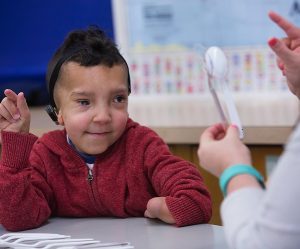This article first appeared in the Oxford University Press. Author’s note to readers: This was a difficult article to be asked to write as I have not personally lived the experience as a parent of a deaf child with additional special needs. This article couldn’t have been possible without my dear friends Kathy Caldicott and Sylvia Walterhouse for allowing me to walk alongside them for over 25 years and learn from each of these strong advocates in regard to the expectations of the school system in educating their deaf children. Thank you for being my mentors!
By Cecelia Klassen
The Issue
As a parent of a young deaf adult and working with deaf and hard of hearing (DHH) children for the past 20 years, I have seen a significant demographic shift in the children served both educationally and in ‘out of school’ programs. Approximately 40% of DHH children have multiple disabilities (DHHMD), yet this population is often treated as invisible, with very little research, support or understanding. Every parent hopes for and expects the best outcomes for their DHH or DHHMD child, but the journey into deafness and multiple disabilities is usually a foreign experience.
Language is essential to the well-being of every human. As Helen Keller said: “blindness separates people from things, but deafness separates people from people.” How can DHHMD children feel like they belong without language to engage with the people around them? A full thriving language is exponentially more vital for DHHMD children, yet sadly, due to a “trade off” philosophy, we sacrifice the DHHMD child’s language in lieu of multiple disabilities support. In some cases, we focus only on the language needs and ignore all the extra special needs of the DHHMD child. Shouldn’t we be supporting the whole child?
What We Know
All DHHMD children need a full growing language with rich exposure from many language role models. Unfortunately, often weaker language models with limited vocabulary/knowledge of DHH learning needs are assigned to DHHMD children. Without a growing language, DHHMD children are at a greater risk of not feeling a sense of belonging in their families and communities. Language is vital to self-worth and belonging.
DHHMD children often are stuck with a dilemma of insufficient support:
- Educational interpreters who don’t perform specialized supports for multiple disabilities vs. an educational assistant who isn’t fluent in sign language or doesn’t have the skills to develop a DHHMD child’s spoken language.
- A Teacher of the Deaf/HH trained for DHH students, but not fully trained to work with multiple disabilities of DHHMD students vs. a Special Education teacher that doesn’t know the language needs of DHHMD students.
The needs of the DHHMD child are complex, yet the system is designed so that the choice is “either/or,” rather than designing a comprehensive program that supports the needs of the whole child.
Language role models and language access shouldn’t be sacrificed in order to provide educational assistants for the DHHMD child’s additional needs. We cannot ignore that DHHMD children need skilled and highly trained individuals to support their additional needs, however, language is a human right and shouldn’t be an afterthought. While some DHHMD children benefit from Augmentative Communication, some are not given a chance to access and develop a full language before it is determined that their lifelong communication method will be an IPad or a Communication Board. Parents and educators should critically evaluate the best communication facilitation for each child.
Why does the system often create a language vs. multiple disability conundrum and not support the whole child? Shouldn’t language be fundamental and multiple disability support be a right for all DHHMD children?
What We Don’t Know
Are we giving DHHMD children the best shot at language or are we lowering the language bar? Will we ever know what potential the DHHMD child may have reached without appropriate interventions/supports for their additional needs? Do we know the long-term ramifications of “trade-off” decisions made for DHHMD children?
Implications
The outcomes for DHHMD children without a full growing language are serious and could lead to their feeling invisible, not belonging, not having enough language to develop quality relationships with friends and family and lacking in community. Professionals should share with the parents, at each step of the journey, the long-term ramifications of impoverished language and the additional support needed for the child’s multiple disabilities. In addition, teachers of the D/HH and special education teachers should collaborate to support the entire child instead of the child’s needs that match the professional’s credentials.
Every DHHMD child needs a parent who is their cheerleader that prepares them for a life filled with meaningful relationships and the ability to reach their full potential without sacrificing language over multiple disabilities. We cannot leave the work to professionals solely to do. This is our role because the relationships we build with our children will last a lifetime. Let language and belonging drive the conversation as we support the whole child.


